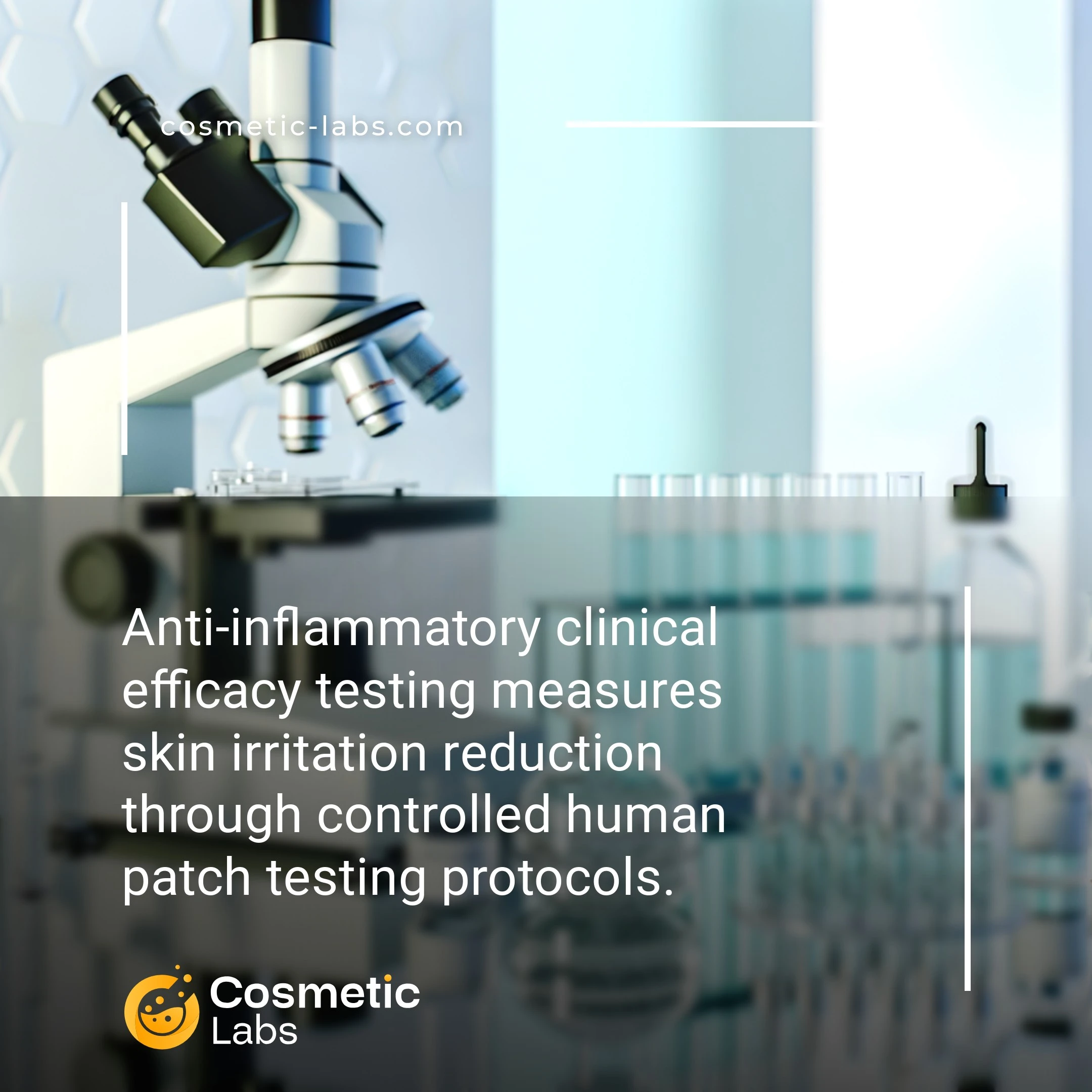Anti-Inflammatory Testing Services for Cosmetic Brands

What is Soothing/anti-inflammation efficacy testing?
Anti-inflammatory clinical efficacy testing services measure how well cosmetic ingredients and formulations reduce skin irritation, redness, and inflammatory responses through controlled human studies. Labs conduct patch testing and biomarker analysis to validate claims like “calms sensitive skin” or “reduces redness in 24 hours,” providing the scientific data brands need for regulatory compliance and marketing substantiation.
Why do you need this service?
Cosmetic labs conduct anti-inflammatory efficacy testing to validate claims for sensitive skin products, acne treatments, and post-procedure skincare formulations. These studies measure cytokine reduction, erythema levels, and barrier function recovery, delivering documented proof that supports marketing claims and regulatory submissions while reducing liability risks for brand owners launching calming serums, redness-reducing creams, and irritation-relief products.
Who provides Soothing/anti-inflammation efficacy testing services?
All cosmetic labs providing Soothing/anti-inflammation efficacy testing services
There is no company providing these services at the moment.
Anti-Inflammatory Clinical Efficacy Testing Services
Cosmetic labs provide specialized testing protocols to validate your product’s soothing and anti-inflammatory claims through measurable clinical data. These services help brands substantiate marketing claims while meeting regulatory requirements for cosmetic products targeting sensitive or irritated skin.
In-Vivo Inflammation Response Testing
Labs conduct controlled studies using human volunteers to measure your product’s ability to reduce skin inflammation markers. Testing typically involves applying controlled irritants followed by your formulation to assess anti-inflammatory efficacy through visual scoring and instrumental measurements.
Standard protocols include:
- Patch testing with inflammatory agents (SLS, capsaicin)
- Erythema reduction measurements using chromametry
- Trans-epidermal water loss (TEWL) monitoring
- Skin barrier function assessment
Results provide quantifiable data showing percentage reduction in redness, irritation scores, and recovery timeframes that support your product claims.
Biomarker Analysis and Skin Calming Studies
Advanced testing measures specific inflammatory biomarkers in skin samples to demonstrate your product’s soothing mechanisms at the cellular level. Labs analyze cytokine levels, prostaglandin production, and other inflammatory mediators before and after product application.
Testing approaches include:
- IL-1α and TNF-α cytokine level measurement
- Histamine release inhibition studies
- Corneocyte analysis for barrier repair
- pH normalization tracking
These studies generate clinical data that validates anti-inflammatory properties and supports specific claims about calming irritated skin. Connect with experienced labs on our platform to design testing protocols that match your product’s intended benefits and target market requirements.
Real-World Applications of Anti-Inflammatory Clinical Efficacy Testing
Cosmetic brands use anti-inflammatory clinical efficacy testing to validate product claims and differentiate their formulations in competitive markets.
Sensitive Skin Product Development
Labs conduct patch testing and biomarker analysis to measure inflammatory response reduction in sensitive skin formulations. Testing protocols include cytokine measurement, transepidermal water loss (TEWL) monitoring, and visual scoring over 14-28 day periods.
Brands developing products for rosacea, eczema, or post-procedure care rely on these studies to support marketing claims. Clinical data from these tests helps justify premium pricing and builds consumer trust through scientific validation.
| Test Method | Measurement | Timeline | Best For |
|---|---|---|---|
| Patch Testing | Irritation scores 0-4 | 48-72 hours | Ingredient screening |
| Biomarker Analysis | IL-1α, TNF-α levels | 2-4 weeks | Mechanism validation |
| TEWL Monitoring | g/m²/h values | 4-8 weeks | Barrier function |
Post-Treatment Recovery Products
Dermatology practices and medical spas need validated products for post-laser, chemical peel, and microneedling recovery. Labs test formulations using controlled inflammation models that simulate treatment-induced skin stress.
Testing includes erythema measurement, healing time assessment, and comfort scoring with volunteer panels. Products showing measurable inflammation reduction within 24-48 hours gain approval for professional recommendation programs.
Ready to validate your anti-inflammatory claims? Connect with specialized cosmetic labs on our platform to design testing protocols that support your product positioning and regulatory requirements.
